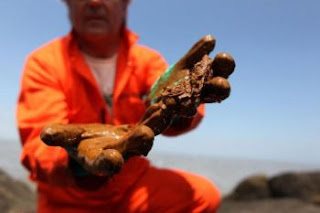 BP engineers have been unable to stem the torrent of oil gushing by the hundreds of thousands of gallons into the Gulf of Mexico each day following the explosion that sank the Deepwater Horizon offshore drilling rig last month. Weeks later, the BP oil spill is still a environmental catastrophe and PR nightmare. Tar and oil are still being found in new places, more wildlife is dying every day and BP still has not fixed the spill. Shouldn't companies have a contingency plan that prepares them to quickly fix their wrong doing and respond to the public well when a worst case scenario happens?
BP engineers have been unable to stem the torrent of oil gushing by the hundreds of thousands of gallons into the Gulf of Mexico each day following the explosion that sank the Deepwater Horizon offshore drilling rig last month. Weeks later, the BP oil spill is still a environmental catastrophe and PR nightmare. Tar and oil are still being found in new places, more wildlife is dying every day and BP still has not fixed the spill. Shouldn't companies have a contingency plan that prepares them to quickly fix their wrong doing and respond to the public well when a worst case scenario happens?Of course a company should! This is a perfect example of a corporate responsibility and public relations disaster. Regardless of how BP responded right away, apologizing, taking responsibility, trying to fix the spill, etc. Yet, BP hasn't fixed the problem! That's when a strong brand history and an immediate PR crisis communications plan just don't matter anymore. PR needs to be followed up with action. This why there needs to be a complete contingency and response plan for every company. Especially for something that truly could happen. For example, if you're an oil company, you should probably have a response for an oil spill at any drilling area of yours.
I was angered after watching Mike Williams 60 Minutes story on the spill. According to Williams the BP explosion was the result of the company's desire speed up drilling and to save money. Drilling faster actually made the bottom of the well split open.
Williams story told that just four weeks prior to the explosion, the well's most vital piece of safety equipment was damaged when a worker accidentally bumped into a joystick that applied hundreds of thousands of pounds of force onto a closed blow out preventer which was closed by a rubber gasket called an annular. Congress is currently looking into other things incidents that occured at BP leading up to the spill which is becoming known as the worst environmental disaster in U.S. history.
In my opinion, it will be amazing if BP can 'dig' out of this huge hole they're in. I'm not sure they'll have the money of the customers to stay in business after everything is finally cleaned up.


